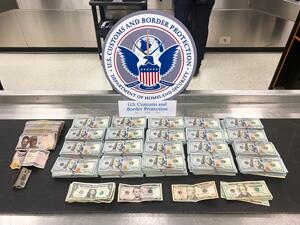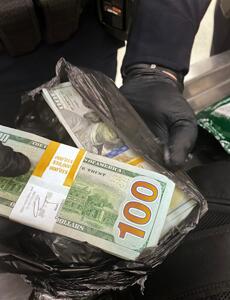PHILADELPHIA – U.S. Customs and Border Protection officers seized more than $200,000 in unreported currency from a Nigeria-bound New Jersey man at Philadelphia International Airport Sunday night.
While conducting outbound enforcement on a Frankfurt, Germany-bound flight, CBP officers inspected a Nigerian-born U.S. citizen destined to Port Harcourt, Nigeria. Officers explained U.S. currency reporting laws and the traveler reported verbally and in writing that he possessed $11,000.
During a subsequent search of his baggage, CBP officers discovered $200,068 in U.S. dollars, and the equivalent of $251.54 in Nigerian Naira for a total of $200,319.54.
This is CBP’s third largest unreported currency seizure in the Area Port of Philadelphia since the agency’s inception in 2003. In September 2004, CBP officers seized $621,353 in U.S. and foreign currency, and travelers checks, and in February 2006, CBP officers seized $227,950 in U.S. currency.
CBP officers seized the currency and remitted $1,251.54 to the traveler for humanitarian purposes and released him. CBP is withholding the man’s name because he was not criminally charged.
Homeland Security Investigations (HSI) Philadelphia’s, Border Enforcement Security Task Force (BEST), responded to the airport and debriefed the passenger. HSI has initiated an investigation and will examine the origins of the suspected illicit proceeds.
There is no limit to how much currency or other monetary instruments travelers may bring to or take out of the United States. However, federal law [31 USC 5316] requires travelers to report all currency of $10,000 or greater to a CBP officer and complete U.S. Treasury Department Report of International Transportation of Currency or Monetary Instruments [FINCEN 105]. Read more about currency reporting requirements.
CBP offers advice to travelers who may consider violating federal currency reporting laws. Travelers can get an early start on reporting their currency by completing the fillable FINCEN 105 form prior to a CBP arrivals or departure inspection.
“This is a significant amount of unreported currency for any traveler to be carrying, especially with today’s electronic systems that make transferring currency much easier,” said Joseph Martella, CBP’s Area Port Director for the Area Port of Philadelphia. “The most important lesson international travelers can take from this seizure is to truthfully report all currency in their possession to Customs and Border Protection officers when they arrive to or leave the United States.”
“The interagency cooperation between HSI Philadelphia and our Customs and Border Protection counterparts is unparalleled,” said William S. Walker, Special Agent in Charge of HSI Philadelphia. “Through our combined efforts, this team is having a significant impact on the illegal transportation of currency and assets in and out of the U.S.”
CBP officers and agents seized an average of about $342,000 in unreported or illicit currency every day during 2021 along our nation’s borders. Unreported bulk currency may sometimes be the proceeds of illegal activity, such as financial fraud and money scams. Greed may also cause some travelers to smuggle unreported currency that they may have lawfully attained to shield it from family or business partners.
The consequences for violating U.S. currency reporting laws are severe – from missing a flight and interrupting vacation plans, to seeing all their currency seized by a CBP officer, to facing potential criminal prosecution for bulk currency smuggling.
CBP encourages all travelers to learn the rules governing what they can and cannot bring to the United States, plus the steps during CBP’s international arrivals process by viewing CBP’s Know Before You Go webpage. Just a little research can save travelers time during their arrivals inspections and get them to their destination sooner.
CBP’s border security mission is led at U.S. Ports of Entry and at overseas CBP Preclearance locations by CBP officers from the Office of Field Operations. CBP officers screen international travelers and cargo and search for illicit narcotics, unreported currency, weapons, counterfeit consumer goods, prohibited agriculture, and other illicit products that could potentially harm the American public, U.S. businesses, and our nation’s safety and economic vitality. Learn what CBP accomplished during “A Typical Day” in 2021.
Learn more about CBP at www.CBP.gov.
Follow the Director of CBP’s Baltimore Field Office on Twitter at @DFOBaltimore for breaking news, current events, human interest stories and photos, and CBP’s Office of Field Operations on Instagram at @cbpfieldops.

